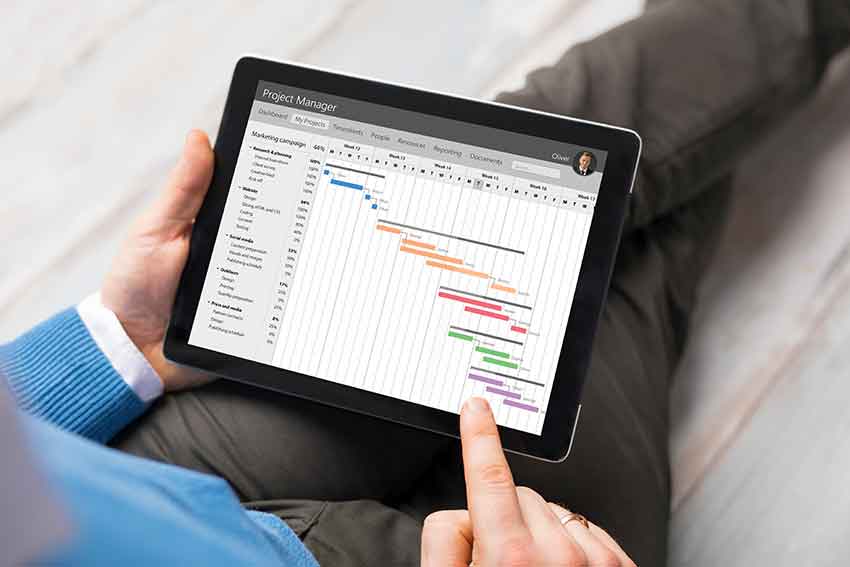Show:
What is an IT Project Manager? Definition and Responsibilities
The role of an IT project manager has become increasingly important. But what exactly is an IT project manager? What are their responsibilities and why are they so crucial in the tech industry?
We’ll explore their key duties and discuss the pivotal role they play in ensuring the successful execution of IT projects. Whether you’re considering a career in this field, or simply interested in understanding more about the IT landscape, this comprehensive guide will provide valuable insights.

What is an IT Project Manager?
Let’s debunk a common misconception straight away: IT project managers are NOT just glorified task trackers. They are strategic thinkers who understand both the big picture and the granular details of a project. They are the bridge between the technical and non-technical teams, translating complex IT jargon into plain language that everyone can understand.
The success of any project would not be possible without the IT project manager’s sharp technical skills. But equally important are their soft skills: their ability to motivate and inspire, to communicate effectively, and to manage conflict. They must constantly balance the demands of the project with the needs of the team, all while keeping an eye on the strategic goals of the organization.
5 Key Responsibilities of an IT Project Manager
We already know that IT Project Managers play a pivotal role. But what exactly does this role entail?
Project Planning
In a rapidly changing IT landscape, where technologies evolve at breakneck speed project planning remains a constant. A well-crafted plan provides a roadmap, guiding team members towards their shared destination – project completion.
But it’s not just about reaching the end. It’s about the journey itself. Project planning ensures resources are used efficiently and tasks are allocated judiciously. This results in avoiding burnout and maintaining high morale among team members – a critical factor often overlooked, yet vital for sustained productivity.
Moreover, an effective plan allows for accurate budgeting and timely delivery, two aspects that directly impact a project’s bottom line. It also enables the manager to anticipate potential obstacles and devise contingency plans, thereby mitigating project risks.

Team Management
IT project management is a complex and demanding discipline. At its heart lies the crucial responsibility of team management. Why? It’s simple. A well-managed team is like a well-oiled machine, capable of delivering high-quality results on time, every time.
Imagine you’re leading an IT project to develop a cutting-edge software application. You have a team of talented individuals – programmers, testers, designers, and analysts. Each one is a vital cog in your project machinery, holding a unique set of skills and expertise.
However, their individual brilliance doesn’t guarantee collective success. That’s where your role as a project manager comes into play.
You need to make sure that everyone understands their roles, the project goals, and how their work contributes to the bigger picture. You have to foster a culture of open communication, where ideas are shared freely and problems are addressed promptly. By doing so, you not only maximize productivity but also keep morale high.
Budgeting
Budgeting is about calculating the cost of resources, hardware, software, or manpower as well as predicting the unpredictable, anticipating potential roadblocks, and planning for contingencies. You need to factor in everything from unexpected server downtimes to last-minute changes in project scope. Overlook something, and you’ll find your project costs spiraling out of control.
But why is this so crucial? Budget overruns can strain client relationships, damage your company’s reputation, and even lead to project cancellation.
On the other hand, a well-managed budget is a sign of a well-managed project. It demonstrates your ability to deliver quality results without wasting resources, which is a highly valued skill in today’s competitive business environment. Here too, a time tracking software can be invaluable, helping you to accurately estimate costs and keep track of expenses in real-time.
Quality Control
Consider an IT project manager leading the development of a new software system. This isn’t just about writing code. It’s about ensuring that every line of code contributes to a stable, efficient, and user-friendly software system. Every bug, glitch, or performance issue is a potential setback – a hurdle that can delay the project, frustrate the team, and disappoint the client (the worst case scenario!).
That’s where quality control comes in. An effective IT project manager reacts to problems but, more importantly, anticipates them. They implement rigorous testing protocols, establish clear performance benchmarks, and foster a culture of continuous improvement within the team.
They understand that in the IT industry, quality isn’t just a goal – it’s a journey. And as the leader of this journey, the IT project manager holds the key to a successful, high-quality project.
Stakeholder Communication
Stakeholder communication is the bridge that connects the project team with the outside world – clients, sponsors, users, and anyone who has a vested interest in the project.
The IT project manager is the point of contact for all these stakeholders. They need to keep everyone informed about the project’s progress, address their queries, and take their feedback into account.
You may think that it’s just about sending out periodic updates or holding regular meetings. But there’s much more to this as IT project managers must make sure that the stakeholders feel involved, valued, and confident about the project’s success which is much more difficult than it seems at first glance.
Why is this all so important? Because effective stakeholder communication fosters trust, promotes transparency, and ensures alignment between the project goals and stakeholder expectations.

How to Become an IT Project Manager?
This rewarding career path offers a unique blend of technical know-how and leadership skills, opening doors to innovation and progress. But how can you actually become an IT project manager?
- Education. Get a bachelor’s degree in a related field such as Information Technology or Computer Science, but don’t stop there! An advanced degree like a Master’s can give you an edge. But education is just the first step.
- Get real-world experience. Dive into the IT world and accumulate years of experience in various roles. This will provide you with an understanding of the broader landscape and how different pieces connect.
- Obtain certifications. Consider obtaining a Project Management Professional (PMP) certification or a Certified ScrumMaster (CSM) certification. These certifications not only increase your knowledge but also demonstrate your commitment to the profession.
- Master the art of communication, leadership, and problem-solving. The ability to communicate effectively with both tech gurus and non-tech colleagues is crucial.
- Never stop learning. The IT industry is ever-evolving, so staying up-to-date with the latest trends and technologies is a must. Conferences, webinars, online courses – make them your best friends.
Conclusion
In essence, an IT Project Manager is an orchestrator of technological advancement within an organization, a role that demands a unique blend of technical acumen, strategic planning, and leadership skills. They are the unsung heroes who ensure that the wheels of the IT department keep turning smoothly and efficiently, contributing significantly to the overall success of an organization.

 Return to Previous Page
Return to Previous Page








